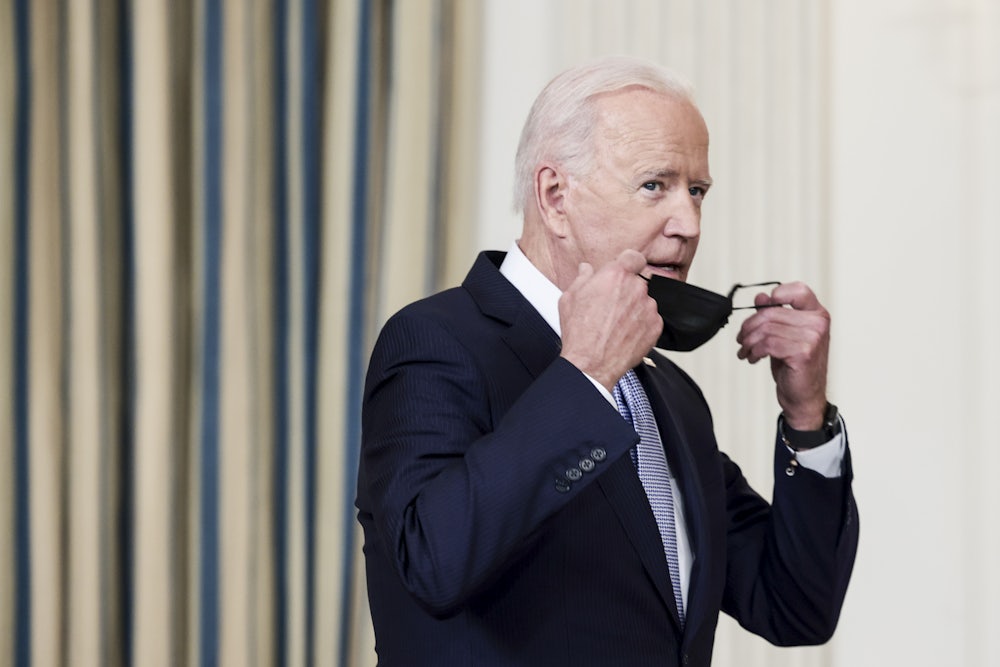Joe Biden is trudging through the worst approval ratings of his presidency. The president’s low approval comes after months of headline-making challenges: the botched withdrawal from Afghanistan, a diplomatic row with France, Haitian refugees being horsewhipped by Customs and Border Patrol officers, lagging jobs numbers, supply chain delays, and fears over continuing month-on-month inflation. Meanwhile, after a prolonged public battle, Democrats seem finally to be muddling toward a compromise Build Back Better budget reconciliation package.
It’s tempting to see salvation for Biden and the Democrats in passing these marquee bills, legislation on which he’s staked his presidency and Democrats have staked their future (assuming they succeed). Passing everything from critical climate change legislation to paid family leave to universal pre-K would massively benefit the country, after all—and so would benefit any president. And yet this obscures the fundamental issue that has and will continue to define the Biden presidency: the state of the Covid-19 pandemic.
For a few glorious months in the late spring and early summer, it looked as though Covid-19—or at least the pandemic piece of it—was going to be a thing of the past. As vaccination rates shot up, daily cases fell to an all-time low. Restaurants, bars, and venues were struggling to meet pent-up demand as unmasked patrons clamored to get in. At the end of May, President Biden’s approval rating was at a high of 55 percent.
And then there was news of a new, more transmissible variant that had caused a massive outbreak across India and was wreaking havoc in the U.K., too. Delta—not just more transmissible but also capable of piercing through our vaccine shields—soon made landfall, spreading rapidly across communities where early vaccine hesitancy had long since morphed into hardline vaccine resistance. Masks went back on. Cases exploded, and hospitals filled through the summer and into the fall. We crossed an unheralded 700,000 deaths.
Rising cases and hospitalizations on the heels of the promise of freedom exacerbated the economic consequences of Covid-19. Rather than go back to work, millions of Americans chose to leave their jobs, in what’s come to be known as the Great Resignation. Limited production capacity choked off the supply of goods and services across the economy, helping set off a supply chain debacle and reigniting what was initially thought to be just a temporary inflation from an economy waking back up. Biden’s approval rating was underwater by the end of August, just as Covid cases peaked nationally.
Americans are burnt out. They’re tired of the constant anxiety cycles as Covid numbers ebb and flow. They’re tired of working at home. They’re tired of working outside the home as understaffing, angry clientele, and the risk of Covid abounds. They’re tired of having to pay more and wait longer for stuff. And they’re blaming that on the president.
Indeed, Biden and his top advisers have always understood that his administration would be judged mainly on their handling of the pandemic. But they misjudged how much of the pandemic they could actually control. The administration pulled out all the stops to deploy vaccines around the country. But the brutal combination of politicization and disinformation slowed uptake to a trickle in conservative communities, allowing delta to use these communities as a staging ground for a national surge.
Since, they’ve rightly switched tack from pleading and cajoling to mandating and enforcing vaccines. It’s working—but not without highlighting the mistrust that’s driving vaccine resistance in the first place. They’ve pushed boosters to allay the anxiety of breakthrough infections. But getting ahead of the science cost them two high-profile resignations at the Food and Drug Administration. Biden’s approval over his handling of the pandemic has fallen steadily. He’s still in the black, but now by only about seven points, way down from the 30-point advantage he held back in the summer.
But there is light at the end of the tunnel. As painful as delta has been for the country, the surge has been declining precipitously over the past two months. Cases are down 57 percent since their peak in the beginning of September and continue to fall in every region of the country. Perhaps more importantly, a recent meta-analysis of predictive epidemiologic models at the Covid-scenario modeling hub suggests that cases should continue to fall through March. The model assumes that childhood vaccines are approved, which is expected later this week or next. It also assumes that a new, more transmissible variant does not emerge—and even in the scenario where one does, it predicts a far less pronounced increase in cases than we experienced with delta. Despite there being no alternative to vaccination, surviving Covid-19 does afford a level of acquired immunity that is more variant-specific and less durable and that contributes to our overall herd immunity. Speaking as an epidemiologist, this scenario makes sense. Indeed, delta was so efficient at finding and infecting susceptible people that it has left little room for another variant in its wake.
This all potentially bodes well for Biden and Democrats in the near term. Nevertheless, it’s worth considering the long-term consequences the delta surge may have had on the Biden agenda—not to mention the future of our country. Regressive Democratic senators like Joe Manchin and Kyrsten Sinema have been able to leverage Biden’s relative political weakness to negotiate down, if not away entirely, critical spending on everything from climate to community college. What might have been if delta hadn’t erased so much of Biden’s political capital?
Ultimately, however, passing the infrastructure deal and budget reconciliation package isn’t enough. The Biden administration needs to press its advantage on the pandemic. That means nailing the childhood vaccine rollout across the country. It means continuing to address its economic fallout. And it means doing more to vaccinate the rest of the world—where another variant is most likely to emerge. As damaging as a new variant was in the middle of 2021, just imagine what a variant emerging in August 2022 could mean.








